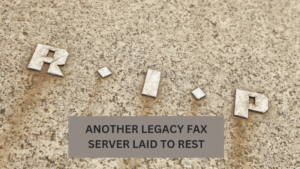It would appear Sony Pictures CEO Michael Lynton has learned a big lesson from the 2014 hack that dealt a huge blow to his company. The movie magnate stated at the Code/Media conference that he now uses faxing to send private documents rather than emails. This particular cyberattack levied against Sony involved the leaking of private company email, as well as damage amounting in the millions of dollars, according to The Telegraph.
But what exactly happened to Sony Pictures, and why would this particular hack make a high-powered CEO resort to using legacy faxing for his private correspondence?
How the original hack occurred
On Nov. 24, 2014, a number of Sony Pictures workers found that they couldn't log into their computers. Rather than the regular bootup screen, these employees were met with a declaration that the system had been hacked by the GOP – that's the Guardians of Peace, not the Grand Old Party. According to The Washington Post, the message went on to say that the group would leak private company information unless Sony gave in to the GOP's requests. These demands never seem to have been made.
At any rate, the GOP went on to post quite a lot of private Sony Pictures correspondence, with a particularly scandalous email chain between a former Sony co-chairwoman and a producer lamenting at the stuck-up ego of actress Angelina Jolie, according to The Telegraph. Many other private messages were leaked along with this one, and Sony Pictures instantly went into damage-control mode.
Sadly, the company simply couldn't stem the flow of information. In fact, the FBI had to issue a warning to businesses to look out for similar attacks, as law enforcement agencies were having trouble pinning down the culprits. The culprits behind this attack were never found out, although many speculate that North Korea was involved, as Sony Pictures was coming out with a comedy involving the attempted assassination of Kim Jong-un. However, these assumptions were never proven.

How can faxing help?
With all the controversy surrounding the Angelina Jolie emails, as well as the many other damaging pieces of information leaked, it's not surprising Lynton has decided to utilize a legacy fax machine in order to keep his messages private. Emails are notorious for being incredibly insecure – as this particular cyberattack shows in glaring detail – while faxing is well-known for keeping messages out of the hands of nefarious individuals.
"My fax machine is in great use at this point," Lynton said at Code/Media. "I write it out by hand and then I put it in the fax at least once a day. I'm not being facetious."
The fact that Lynton is using this technology every day shows just how versatile faxing is as a secure means of communication. A major movie mogul, most likely handling multi-million dollar deals regularly, trusts faxing to keep his most private correspondence a secret.
"Fax over IP is an innovative piece of technology."
FoIP has the safety of legacy faxing, with much more convenience
While it's great to see a company executive solving his cybersecurity woes with legacy fax machines, these systems do have their drawbacks. To begin, the physical security of these machines must be maintained at all times. Having a fax machine in the office break room may be convenient, but it allows anyone passing by to have a direct look at any private correspondence within. On top of that, the physical papers sent through the machine must be guarded. A burglary at a facility utilizing legacy fax systems can very easily result in the loss of incredibly important data.
What's more, these machines are often slow and lumbering when it comes to receiving a message. People these days are used to the convenience of email and instant messaging, and asking an office full of employees to slow down their entire day by waiting on that vital piece of correspondence really isn't an option.
Thankfully, there is a way to have the speed of digital messaging with the security of legacy fax systems. Fax over IP is an innovative piece of technology that allows you to send faxes over the Internet, and because these documents are encrypted, you can expect them to get to their destination without being viewed by any malicious third parties.
Enhance enterprise communication, collaboration and compliance efforts with a proven FoIP solution from FaxCore. Contact FaxCore today to learn more about their 'Partly-Cloudy' fax solutions.




